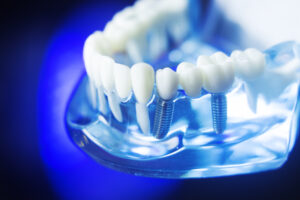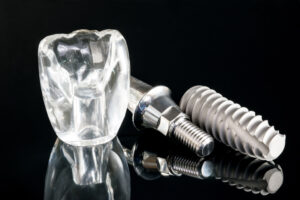If you’re thinking of getting dental implants, you may have learned that you’ll need bone grafting first. This news could have come as a shock to you, but patients who need bone grafting for dental implants are much more common than you would think.
If teeth are missing for an extended period of time, the area of the jawbone that used to hold them in place starts to deteriorate because it is no longer needed. When this happens, there isn’t enough bone density to support your implants and the restorations that go with them. Bone grafting is a straightforward periodontal treatment that rebuilds the jawbone so that dental implants can have a secure foundation.
What Happens During a Bone Grafting Procedure
While bone grafting for the jaw might seem like it should be a complicated surgical procedure, it’s actually quite simple and can even be done in our office with only local anesthetic. Before the doctor starts work, the gum tissue is numbed, and a small incision is made near the part of the jawbone that needs to be restored. Sutures are used to close the incision after the grafting material is inserted into the jaw, which helps your jaw and gums heal properly.
Grafting material can come from your own body (the back of the jaw is commonly used for periodontal bone grafting) or it can be synthetic. Bone grafts may be in the form of gel, putty, powder, or granules, but no matter the material used, they all stimulate your body’s natural ability to regrow bone where it has been lost. The added bone grafting material and your own bone will eventually fuse together, providing you with the necessary support for effective dental implant placement and the best possible treatment outcome.
What to Expect After Bone Grafting
At Champagne Smiles, you’ll benefit from our concierge-like service at every step of the bone grafting and dental implant process. In addition to sedation, we can make your procedure comfortable for you by providing you a warm blanket, a visit from our therapy dog, or a neck wrap to soothe tense muscles.
You won’t feel any discomfort during the bone grafting itself, but when your local anesthetic wears off, you’ll experience tenderness and swelling. The incision site is normally inflamed and sore for several days, but the pain is generally mild. Over-the-counter pain relievers, cold compresses, and a diet of soft, easy-to-chew, or liquid foods will help you recover faster and manage any pain.
Following the completion of your bone grafting procedure, the body will begin to regenerate the bone in your jaw, a process which can go on for many months. You may be eager to get your dental implants from Dr. Champagne, but it’s important to wait so that we can make sure you have the necessary bone density for successful implant placement. Implants that are inserted without enough jawbone support are more likely to fail because they can move in your mouth or even fall out as you bite and chew.
If you’re concerned about missing a tooth while you wait for the bone grafting to rebuild your jaw, Dr. Champagne will provide a temporary restoration so you can feel confident about your smile even while your final restoration is still in progress.
Learn More About Bone Grafting in Monmouth County
If you’re ready to start your journey to better oral health with Dr. Richard Champagne and a truly collaborative and compassionate dental team, contact Champagne Smiles in Morganville, NJ today to schedule your first appointment.




